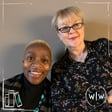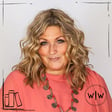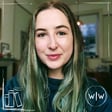Become a Creator today!Start creating today - Share your story with the world!
Start for free
00:00:00
00:00:01

#189 - Ellie Monago
Psychological thriller author and practicing therapist, Ellie Monago joins us on the podcast this week to talk about her latest novel, her ups and downs in publishing and why she ultimately decided not to have an agent.
💖 Join the Patreon 🙏
Support the show and get access to the extended cuts early and ad-free!
📚 The Chosen Ones and Other Tropes 🥳
Jamie, Melissa and Noami talk about all things writing, tropes and publishing!
✍️ WriteMentor 🧑🏫
Get a whole month with WriteMentor's Hub for free using the coupon code 'Write&Wrong'.
🎙️ Zencastr 🎬
Click on this referral link to get 30% off your first three months with Zencastr.
Transcript
Introduction to Writing and Plot Holes
00:00:00
Speaker
Ooh, a spicy question. I love it. Because the writing is sort of everything. You can fix plot holes. So some readers love that and some readers are like, but I wanted more of this. So it's kind of a gamble.
Meet Ellie Monaco: Author and Therapist
00:00:14
Speaker
Hello and welcome back to the Right and Wrong podcast. Joining me today is author of psychological thrillers and practicing therapist, Ellie Monaco. Hello. Hi, thanks so much for having me.
00:00:26
Speaker
Thanks so much for coming on. Let's jump right in.
Unveiling The Marriage Test
00:00:29
Speaker
ah Let's talk about the new book, The Marriage Test, which is out in the UK on the 3rd of September. Tell us a little bit about it. So it is a book about four couples who go on a reality TV show, um presumably to save their marriages. um But then there's all kinds of intrigue. And then there's kind of an Agatha Christie kind of element of like, one dies and then who's next. So they're kind of sort sort of I would say they're stranded there, but um but they become sequestered after the police arrive. So um so they kind of are stranded there. and and and And someone is a killer. We don't know if it's one of the couples or one of the um the staff of the show. So there's there's a lot of intrigue and a lot of possibilities.
00:01:12
Speaker
Okay, okay. I like how little chocolate they're like, oh, they get sequestered that Agatha Christie style. That's one of those tropes where you're kind of like, in that setting, it's fine. Because we all know that the story is going to be better if everyone's stuck together. Yes, you have to find a way. I mean, I think as an author, you're like, I have to find a way in in this year or contemporary, if you write contemporary stuff, right? In in a way, if you write um historical, it can be easier because you don't have to deal with cell phones and social media and all of these things, right? But like to make to be truly stranded, it it takes a little work, it takes a little doing now. Yeah, to be like isolated as well, because like you say, it's too easy to just get a message out to someone beyond the the the immediate circle. Yes.
Ellie's Publishing Journey
00:01:58
Speaker
is Am I even thinking that this is the fifth book that you've published or have you published more?
00:02:03
Speaker
I have published more um in that so there's ah the the under as Ellie Monaco, I have um two that are from Amazon's Lake Union. um And then I have the three that are from book a tour which have come out this year with the marriage test being the third. So that's five as Ellie Monaco and then I have I think it's five as ah Holly Brown, which is my, well, not my given name, but my married name, so my actual name. Right. And are they all psychological thrillers?
00:02:35
Speaker
They are. i've I've written other books and I've had agents for other books and um and things did not pan out, unfortunately. like Like when we were out on submission, the agent had it out on submission and and then the pandemic hit and then things shut and shut down and it wasn't publishing kind of tightened in a sense like of like, should we still publish it? you know and it Just the timing didn't didn't work out. So that that was more sort of an up market.
00:02:59
Speaker
um women's fiction book that that we were so was out on submission then and then I um ended up sort of returning more to psychological thrillers because they're they're great fun so um not that a mark of women's fiction can't be great fun but but I do think that that in in my case it's more fun through a psychological thriller so I kind of went that way but I I might want to sort of um branch out again in the future who knows Okay.
The Pen Name Strategy
00:03:23
Speaker
But you you did release psychological thrillers under Holly Brown. So I'm wondering, usually people take um a pen name because they're writing in a different genre. How come you were prompted to take a pen name?
00:03:38
Speaker
Back when my first Ellie Monaco book came out, which was with Lake Union, that was ah that was Neighborly, called Neighborly. and It was because um in sort of traditional publishing, you're pretty much only doing a book a year. and My agent and I spoke about the fact that I like to write a lot. and um and so An idea that she had was that I could also be writing under a pen name and that um like Union might be a good fit for me at that time. and so It was an idea that she had in order to kind of keep up more with my pacing and also you know make more money while doing so. so that That was how that originally came about. ah Okay. so The Holly Brown stuff was traditionally published. Yes. so that was Those were with Harper Collins.
00:04:26
Speaker
Ah, okay. Okay. And then so you wanted this as like an additional thing on a different, but it was fine if you did it with a different name. Oh, that's interesting. Okay. That makes sense. Yes. And speaking of writing quickly, you mentioned three books came out this year with Booker Joe.
00:04:43
Speaker
Yes.
Bookouture's Unique Model
00:04:44
Speaker
So um one of the things I really love um with with ah with traditional publishing, I guess, is that they want a longer lead time because they're um they're trying to get more like traditional media as well, right? Like they're trying to get more drama, more publicity. And so, book of chores model and a lot of digital publishing's model is is different in that they're not looking for that traditional coverage, you know, so they do, um they do some marketing, but they do less of traditional PR. um the The difference being that, you know, the the PR um would, again, be involved more lead time and having to pitch to various outlets. So Bookouture does less of that. And so they require less of a ramp up, they require less of a lead time. So it allows for if if someone sort of is into what you're doing, then the next one can come pretty quickly on the heels. And so, which is great for me, again, in terms of in terms of pacing.
00:05:39
Speaker
How long do you think on average it takes you to to write a novel from kind of inception to first draft going to editor?
Ellie's Writing Process
00:05:50
Speaker
Probably about two months. Wow. That's really fast. Yeah, yeah. Well, and there might be a lot of changes that come after that first draft, but the um the coming up, I think a lot of, I have a lot of ideas. I have a very long idea folder, and and um and so i can I pitch a lot of ideas. And then I love the collaboration of, like, so I love collaborating with an agent, and I don't have an agent anymore now. I collaborate with just my editor at Book Mature, but um but the ability to just kind of like fire off a lot of ideas and then they say, get going. And then I sort of sit down and start mapping out. So I'll i'll think often of a situation and then I'll think of who would believably be in that situation because I feel like you have to, ah when when sort of things that seem like they might be outlandish or happening in ah in a thriller, I think it's important that those things derive from who the person is, like that it is it would be outlandish for perhaps you or me don to do that thing. But the character that I've created, it has to be believable within their psychology. You know, that to me is what what makes makes for a good psychological thriller is that things don't come out of, they can be surprising, but they don't come out of left field because they should, they should come out of authentically who that character is and the high stress urgency of the situation.
00:07:07
Speaker
Okay. So the kind of inception point for your stories is a setting or like a thing happening. It's not a character or a theme.
00:07:18
Speaker
Right. I'll i'll think of ah of a situation, think of a premise, and then I will think of who I want to put in there to put into that situation. And I'll also think if I already had plot twists in mind, it sounds funny, but I have to write the psychology to the twist in in ah in a certain sense because um other otherwise it doesn't it doesn't flow from who they are. And that that's important to me because I haven't done therapy for a long time. like I often hear things that I I'm like, huh, if you just heard this out of context, ah you'd see like what's going on there? But if I know them in context, you know, I i know them in terms of the how they grew up, I know in terms of, you know, and so it's not, ah yeah, again, it's not out of left field in therapy, and I don't want it to be out of left field in and in the in my novels either.
00:08:08
Speaker
Okay, right. So from that kind of initial situation that you've thought of, do you then kind of plan out the whole thing from that or do you just start writing and see where it goes? i I used to do less planning. Now I do a lot more outlining. I don't know. there There wasn't a decision made really, but I just noticed it was just happening, that I was tending to um have longer and longer kind of descriptions of what might ah what's going to happen at various points in the story. and so it's So there's more planning now. But then
00:08:40
Speaker
I'm in terms of breaking it down into actual individual scenes on that that happens more as i go and i always like to know four to five scenes out so i kind of i have general sense of where the book is headed but i like to have at the beginning of each page i'll sort of have chapter three. this is the scene in chapter three, chapter four, this is the scene. you know And so i'm always I'm never looking at a blank page and that help psychologically that helps me to sit down and I have ah i have a purpose and a plan, but i i I only plan so far out. But like I said, I have an overall vision of the of the novel and the plotting. Right. Is that how you've always approached the writing process or is that something that has evolved over time as you've kind of written more
00:09:28
Speaker
I've always done it where I'm at least three scenes out, but I didn't used to have as strong of ah of an overall arc, you know, or as detailed of an overall arc. So I might sort of have in mind, here's where I want the book to end, and generally speaking, some of the beats of the story. But um but like I said, it used to be, I used to start with like a two page um description of kind of what would be happening. And now it can be a 15 or 20 page description of of what's gonna happen.
00:09:56
Speaker
in the story. so But they're always looking out at least three chapters. That's been something that's always been true. Okay, right. It's not fully like mapped out and planned, but there's definitely a structure ahead of you going in and you're not writing completely blind here.
00:10:13
Speaker
Right, right. and And I think some people might enjoy more of a, I mean, it's not that there's not a sense of possibility, because I can be surprised within a scene, like that I think it's going to take a certain, you know, um it's going to have a certain cadence, or like, it can change within that scene. And then I might change what comes in the next scene, potentially, or the scene, you know, so I might change things. But, but I can imagine that I think some people probably enjoy a ah blank page more than I do. you know So I don't know what it says about me. like I want to sit down with at least an initial, you know but but some people might really like to be like, where do I want to go today? I don't i don't know if that's what some people do, but ah but it's it's it's not my makeup to do it that way.
00:10:54
Speaker
Yeah, absolutely. I mean, I've said this all the time, but it's writing is about finding the the way that works for you. And I've had as many authors on here say that they plan things out or the like plan ahead to some degree, as I've had authors who say, no, that it should just sit down and just start writing and see see where it takes me.
00:11:12
Speaker
And I would be curious if there are personality correlations to that, you know, that if it turns out there's certain, you know, how like, how high strung you are, how how much you have to know it, you know, how controlling you. It's an interesting question of like, if you're looking at these, like personality traits and seeing how they correlate, but, ah but yeah, or if there's no correlation at all. good faith but The one correlation I would say that I have heard people mention frequently is that um often like a debut novel or like the the early stages of writing, authors tend to kind of pants a lot more so they just they don't plan it as much. Once authors have the more they write, the more they kind of work within the publishing system. I think they generally
00:11:56
Speaker
but even if Even if they're still mostly not planning, they do have more plans than they would have previously. Does that make sense? It does make sense. And that's more to do with deadlines and things which didn't exist prior to being in publishing.
00:12:13
Speaker
Right, and it might also have to do with um more inputs, you know, like in terms of knowing what your agent isn't, you know, once or your editor once or, you know, and so you um write, ah you're writing a little more to spec in in ah in a sense, you know, in the freedom of like, you know, nobody's, you know, because there's a there's a way that it's kind of both freeing and scary before you enter the, you know, the system. Like, I think if you're just home and writing, you just you, you write, you know, to I mean, you if you've been reading, also, you maybe have been studying or, you know, how other people do things, and maybe you do have more of a strategic mindset, but
00:12:49
Speaker
At least for for me in the beginning, it was more like, oh, this is just where I want to go. This is just what I want to produce. And and i i hope great and I hope that people will love it you know and in the way that I do. And then as you get deeper in, you get um you you do get more strategic in some ways you know um in terms of thinking, what do people want to buy? What do people you know, what do people like what do what people want to buy for me? What does my editor want to buy for me? I'm thinking what the readers will want to buy as well. So there's there's different considerations that enter into it. Absolutely. ah How long were you?
Finding Her Niche in Domestic Suspense
00:13:24
Speaker
How long were you kind of in that space of writing and submitting before you you kind of got a foot in the door, whether that was um with like a ah ah but a book deal or or signing with an agent?
00:13:38
Speaker
Yeah, so I think my first um books were Chiclet, and that that was under my birth name. um and And so there were two of those. And that was when, so I'm now almost 50, and that was when I was about 27.
00:13:55
Speaker
um where were the the two chick lit books. and then um And then I didn't have an identity as a writer for a long time, I think. i ah i um i I didn't fall out in a bad way with my agent, but there was a sense that like she didn't know how to direct me and I didn't know quite what I wanted to do. And I had gotten that, that the book deal for that came really easily. And it it was very misleading in a way how easy it was. Like I basically,
00:14:25
Speaker
um I was like laid off from a job and I had like six weeks free and I said oh I'm gonna like I never really read chick lit but I was like I think I'm going to write a chick lit book i because it was really there's a lot of hubris in the thing I said I'll just sit down and write this thing and I'll amuse myself and I'm used myself and then I said okay now I'll go and I'll try to get an agent and um so I i queried like 10 people And I got like a few offers and I went with the person I i liked and and it all moved really fast. And it wasn't a lot of money or anything like that, but it was with ah it was with a big five publisher. And so I think that when we ah we sort of broke off,
00:15:04
Speaker
I kind of thought, well, it's a very easy thing to get into. This is not a problem at all. I didn't try to hang on to her. I didn't try to say, well, should I come back to you? know it was I just sort of said, okay. And then I kind of drifted around and I wrote a number of different things. and i um And then I was submitting to different people and I was like, this is not working out at all.
00:15:26
Speaker
Oh, it turns out what people said is true. This is really hard. And and i think then I think god Gone Girl came out, right? And then I think that changed a lot of things for a lot of people because it basically developed, you know, it it created the genre of domestic suspense, which was very well suited to to me because of the fact that I'm a marriage and family therapist. And so domestic stuff is my, you know that's my wheelhouse. So I think then I developed more of a sense of what I wanted to write. you know and And so then i um and then I was just driving to work one day and um and there was ah I heard on NPR, I heard this story and it gave me this idea for what I wanted to do. And then that process went
00:16:10
Speaker
really well like in terms of that submission was one where like I'm getting offers from like really great agents and you know and that one moved but I hadn't gotten you know an offer for four books before that you know it it had been just wandering in the desert for a while there and then and then that I got I got my agent for that and then it was sort of starting up again so um So, in a way, yeah, it's i guess i i yeah so I guess that's a very long answer. i I suppose what it is is that that was the time where I suddenly realized, oh, you don't want to lose an agent again, and you don't want to take anything for granted, and you want to write to the market if you if you need to, to stay in it. And and so that that was when I really got that it was a business in a way that I had not understood the first time around.
00:17:01
Speaker
Right. But having said that, you did part with your agent because you said you don't have an agent currently. correct So then um that agent, yes, that agent who i um I adore, we work together for those five books and and she is someone who doesn't actually do much psychological, like she doesn't do many psychological thrillers. And the book I queried her for was in a way, um they were calling everything the next Gone Girl at that point. And so so I think that it was positioned as if this is Gone Girl meets dot, dot, dot, you know, but it really wasn't, it was much more of a like suspenseful family drama.
00:17:38
Speaker
And as we sort of went along and I was writing more of like, ah I was writing, there was, not there's less emotion, but in a way there was. I think that was a more emotional book. That was called Don't Try to Find Me. And um and and that was a more emotional book. And I think that as I started writing more of sort of straight psychological thrillers, I wouldn't have been the client she would have taken on. Like if I was querying her for a straight psychological thriller, um I don't know that she would have offered me representation.
00:18:04
Speaker
So there was a point we reached where I wanted to do, and I had ideas for sort of and sort of ambitious, strange psychological thrillers, and she just didn't have enthusiasm for them. And so we had a conversation. It was ah it was a great conversation, and I think very highly of her because she basically just was saying, you know I don't want to tell you to write to to what I want for for you. right and so um and And she had a lot of faith that I would find someone who wanted to represent what I wanted to write. and um And I was scared about it. I was sort of scared to be back out on the market You know, it's kind of like when if you break up in any sort of relationship and you like go looking and you're you know you get scared And um and and the truth is that I did not end up finding another agent relationship like her That is that is in fact true. Like I had two agents after that um and like I said one was selling trying to sell the ah the the
00:18:57
Speaker
um contemporary women's fiction and then um another person was selling ah ah a book that actually now is the marriage test interestingly so um so she was so trying to sell that and then we parted ways and then I had another agent who was for the contemporary women's fiction and then Yeah. So, and neither of those ended up being that ah romance of the of the other agent. So, um you know, and then ended, and I ended up going to book a chair where you can go unagented.
Agent Experiences and Success with Bookouture
00:19:26
Speaker
You can just submit to them directly. So that's sort of where, where I am now. Oh, okay. Right. Had you sort of reached a point where you were like, this agent thing's not working out. I'm just going to see, you know, what are my options without an agent? Yes. I think, uh, if,
00:19:42
Speaker
my agent for Don't Try to Find Me and all the other HarperCollins books. If she was taking me back, I would work with her. But ah but I think ah if if what I was doing was what she wanted to sell. But I i think the other experiences um one One was strange where she ended up just, it was the pandemic and she was stressed out and she had little kids at home and she was paring down her list and it was, I don't have any, there's nothing there, to there's no ill will. The other agent um was actually a legitimately bad experience, and which I hadn't had any ah legitimately bad experiences up until that time. and um And maybe it soured me a little bit, but
00:20:23
Speaker
I think depending on what I want to write again. So if I end up wanting to do upmarket you know women's fiction again and then I want a big five publisher because that's what you do. Because digital publishing, that that's not what they're good at, you know generally speaking. Like upmarket, you still want a big five, I think.
00:20:41
Speaker
um unless you can do self-publishing, which I can't because I don't have that sort of marketing drive and that's just not my personality. But I think if you do want just upmarket fiction, then I do still think you want to go for a big five. And in order to get in, the gatekeepers are agents. And so if I do end up writing something like that, I will be back on the agent. I'll be back in the agent hunt.
00:21:02
Speaker
you know, um at that point, I do have contacts because I have a lot of people who've like considered me and even if they said, not this project, you can come back to me. So I fortunately, I don't think I'll be right back in the slush pile. Like I think I have contacts in the industry. um But, ah but yeah, I, if I can do it without i I and just having that strong relationship with my editor at you know, like I do at Bookature, then um then that's a great way for me but but as you know from talking to so many people and um as other authors have talked about on your show right that there's there's a lot of different paths and there's a lot of variables that have to do with who you are and what you want to write and what relationships you want to have and you know so there's a lot of complexity to the business in that way.
00:21:46
Speaker
Yeah, absolutely. And I've spoken to a number of authors on ah from Bookature as well and I think it's quite a lot of the authors at Bookature don't have agents because just the way that their business works and operates, um it's it's very easy. They make everything very easy and they're very like responsive and and and interactive is what I've heard.
Appreciating Bookouture's Flexibility
00:22:08
Speaker
Yeah. Yeah. I think in a way, um if you have a good, strong collaborative relationship with your editor there, ah it takes away some of the need for the agent because I think um a lot of times your agent is is your collaborator, you know? um So it's, yeah, so you don't need to do that quite as, you know, you don't need to sort of du duplicate the relationships in that way.
00:22:29
Speaker
And Bookature, I imagine this is probably a more of a digital first thing than explicitly a Bookature thing, but you're much more likely to get multi-book deals from the digital first publishers than from the um traditional publishers who are looking to do physical print runs.
00:22:49
Speaker
Yes. Yes. I think there's a lot less stress to the book of term model in a way because they're not giving you an advance upfront, you know? So I think that they can take chances on you and wait for you to hit. Whereas I think so you can get a much longer runway to find your audience. Whereas I think with traditional publishing, it's pretty stressful in terms of like, are you going to hit? And if you don't hit, especially if they give you a big advance, you know, in the beginning, You can feel almost black balls. It can be pretty stressful. I have a number of friends in situations where they were excited to get that big splashy debut, and then it doesn't find its audience, and then they're just adrift. They can get dropped by their agent. You know what I mean? It's like, of course, it's always nice to get paid well upfront, but if what you want is longevity in the business. For me, that's extremely important, is longevity.
00:23:47
Speaker
do i and true like I know there's that quote about writers like having written. you know They don't necessarily like writing. and And I love writing. I really do. And and it helps my my mental health is better when I'm writing. And I i want it to go out into the to the world. you know and um And so for me, just kind of having continuity is is really important.
00:24:09
Speaker
you know let less so in a way than like i have to make ah I have to make that big payday. It's more like if I can have consistent paydays throughout, that's great. you know And if I can just kind of keep keep at it you know and keep having that collaboration you know with some with with people who care about what I'm doing and who make it better, then that's a great situation for me.
00:24:28
Speaker
Yeah, I think there's definitely a safety in being the kind of author that consistently is making, you know, a decent return commercially on the books, as opposed to, you know, like you say, there's so much pressure if you on your debut novel get a huge, like, bookseller announces that you have a huge um deal for your first book, the amount of pressure on that book now to perform is so high. And if it doesn't, so many authors are then kind of just, that's it.
00:24:58
Speaker
it's very difficult to find a new deal because, especially with that publisher, they would have they've spent so much money. If it's a traditional publisher, they've spent so much money on the advance and everything that's gone into that. And if the book hasn't made the return, then it's hard to like get their attention again.
Balancing Writing and Therapy
00:25:14
Speaker
Yeah, it can feel like a bit of a punitive um industry in ah in a strange way, right? Because there's a lot of reasons why ah a book doesn't succeed that don't actually have to do with the quality of the the book itself. And there's books that succeed that are not, in my opinion, of very good quality. And and there's a lot of you know serendipity to it and and timing. And if your book hit it the right, you know, I mean,
00:25:36
Speaker
there's There's a lot to it and and that you don't control, but you can be treated as if it was within your control. and You can be treated as if like you let them down on a certain level. right and People don't say that to you directly, but there's a feeling that you were a failed investment. you know and and and that's it's a bad It's a bad feeling. you know and and they're but You're not sure what else you could have really done done differently for it. you know so um yeah no it it's ah it can It can be a stressful industry. I mean i think one thing that alleviates my stress quite a bit is that um I also have my my private practice and and it's not a day job for me in that I really like that too. and And so I think that takes a lot of the stress off too. It's not like I'm like, this is the this is my it is a passion for me to write, but it's not my only passion you know and professionally speaking. and And I do feel really fortunate for that because I know if if that's if that's the thing for you right and and other things are just a day job,
00:26:32
Speaker
you know then so much is is right. it you know it'ss um It's really hard to to keep perspective in that way. you know Your whole heart is is in that. and um and sounds weird but i don't have to have my whole part in it too. And I don't have to have my mortgage payment dependent on it, you know, which which is really early because it's again, it's an uncertain business, you know. so Yeah, of course. ah A friend of mine said to me the other day, actually, because most authors do have a second job and I wanted to come back onto this later, but um a friend of mine said to me the other day, you can someone had told her that you can only consider quitting your job and doing um writing novels full time when your advance has tripled your salary.
00:27:13
Speaker
Oh, and I thought, yeah, that's probably, that's probably about where you need to be to not be stressing about the amount of money you would would or would not be making by consistently getting book deals. Yeah. And it would be good to also have a job you could potentially return to if your pants is dry, right? like it How many of those advances can you get in a row? It's not right. Cause it's, it depends what happened with the book. yeah when that's true it's You can't really count on the next advance is the scary, is the scary bit, right? Like I almost don't know. Like I know people who sold ah like a lot of books and made a lot of money and also and they they're not secure either in a way, you know, they can end up back it, you know, it's not square one, they have some name-wracking, but there' that there's a feeling right that it's, you're never quite sure. And like, I mean, there's there's some writers obviously who reach a ah level.
00:28:03
Speaker
a sort of sort of status and stature that they can be that secure. but its ah i I don't know what percentage I'd give it, but I'm curious what percentage would you give it? like What percentage of writers do you think actually are at that level where they can say, I will consistently for the rest of my life be able to keep getting these advances and be able to live a ah good life?
00:28:23
Speaker
I don't know if it's necessarily advances because the other thing I've heard is that at a certain point, which is probably around five or six um published novels, there is like, an you if you're if you're kind of, I guess if you are continually putting stuff out,
00:28:38
Speaker
just the kind of back catalogue of royalties should be you know hopefully that's giving you a decent enough recurring revenue but it it also depends what we're counting as writers because if we're counting only writers who have published Or are we counting like writers who like have agents but maybe haven't published or writers who have written but aren't? If we're just counting writers that have published, I think it's still a tiny percentage. I think it's really, really small. that would That would be my guess as well. Yeah.
Cultural Connection through TV Critiques
00:29:12
Speaker
Anyway, we are at the point in the episode where we head over to the desert island and I ask you, Ellie, if you were stranded on a desert island with a single book, which book do you hope that it would be?
00:29:26
Speaker
I was thinking that this is this is probably a strange choice because I feel like on ah a certain level it should be ah a novel because I write them. But I was thinking that what might be interesting is ah there's a ah culture critic. um I think her name is Emily Nussbaum and she has a ah book called I Like to Watch.
00:29:45
Speaker
And it's ah it's actually all her writing about TV. I know it sounds odd, but I was thinking it would be, because you would have a yearning for, you know, like to to remember other things, right? And TV is so evocative. Like she has, I think her first essay and there might be about Buffy the vampire slayer, which is very evocative for someone of my age, you know? yeah and And there's stuff about the Sopranos and there's stuff about girls and um and and just all these different TV shows. and And in a funny way, I thought like reading about would still make me feel like part of the culture. Take me back, take me back, take me off my island, take me back to the world. That's a really cool answer. i've've I've never not had an answer like that before because yeah you'd be sort of, you wouldn't necessarily be in the current zeitgeist, but you'd be able to like, yeah, like you say, be in the culture and kind of jump through decades.
00:30:31
Speaker
Yes, I think it takes me through my life because I'm like, where was I when I watched that episode? of So like, yeah, it would tie me to like where I was and who I was watching things with and who I used to talk about. to you Because it used to be, I don't know if this seems true to you, but like it feels like I used to talk to people about TV and movies much more than I do now. I'm not sure why that is.
00:30:53
Speaker
I think it's because there was far less to watch. So everyone was watching the same things. Whereas now there's an absurd amount of choice of things to watch. So it's very difficult for everyone to be on the same wavelength and watching the same thing until like something like a Game of Thrones or whatever it is comes along and and that captures kind of everyone's attention.
00:31:21
Speaker
Right. that's Yes, that's probably true. like Things were a cult like an event where you watch them at that time. like we had We started being able to tape things, you know but then the tape surround. It was like, yeah, things were an event. They used to be like, I don't think this is water cooler TV. I don't think that's a thing. And you had to you were bound by the fact that it if it was on a Thursday night, everyone was watching it on Thursday night, as opposed to, you know, something comes out on Netflix, and everyone's watching it whenever they want or whenever they have time. You're not all coming in into work the next day. Yes, yes. And then if you're not on social media, like I'm not really on social media, where I guess I assume that people are still doing that, where they're all talking about something that they just saw, right? Like the the season dropped, and now everybody binged and everybody and I can see how that's actually really fun. Because it
00:32:07
Speaker
I do feel like it used to be that like the day after something you would all be talking about it, you know, like the water cooler idea. Yeah, exactly. Yeah, absolutely. um No, that's a really, that's such a cool and original answer to that question. I really like that.
00:32:22
Speaker
um Next up, I am going to ask some questions about um the influence of being a therapist, what what that has on your writing, um finding work, life, writing, balance, and advice for people starting out in publishing. But that's going to be in the extended episode, exclusive to my wonderful Patreon subscribers. Because there's just so there's just so much information out there right about like what questions you ask a potential agent about. So just be a really informed consumer.
00:32:52
Speaker
Yes. I think that's that is great, um very approachable advice as well as something that that everyone can do. and Thank you so much. and And thank you so much for coming on the podcast, Ali. It's been really interesting chatting with you and really fun hearing about everything you've been up to, how kind of your work and and writing and publishing experience um has been. It's been great. Thank you. Thank you. You're great at what you do. I just want to mention, I just, yeah, your interviewing style is awesome. It's really a comfortable, wonderful time to talk with you. So thank you so much.
00:33:22
Speaker
Oh, thank you. That's very kind. And by the time this airs, Ellie's new book, The Marriage Test, will be out um so you can go get it in all the usual places. To support the podcast, like, follow, and subscribe on your podcast platform of choice. Join the Patreon for free content and subscribe for ad-free extended episodes. Thanks again, Ellie, and thanks to everyone listening. We will catch you on the next episode.



















